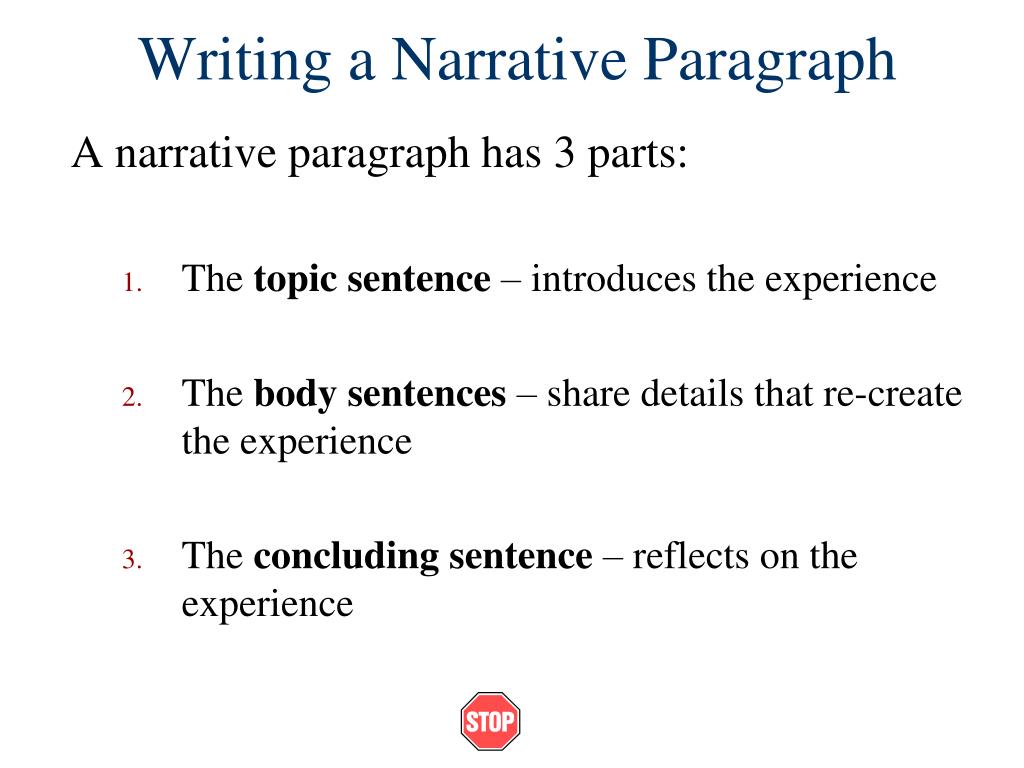
Write some notes about why the event was significant. Then create a topic sentence to concisely explain what you will recount in your paragraph and why it matters. A good narrative topic sentence could be "Terri's only day working as a dishwasher was one of the worst days of her life." When writing a narrative essay, remember that you are sharing sensory and emotional details with the reader. Your words need to be vivid and colorful to help the reader feel the same feelings that you felt. Elements of the story need to support the point you are making Writing a Narrative Paragraph Once you finish prewriting, you are ready to write your paragraph. These writing activities will help you create a topic sentence, body sentences, and an ending sentence. You'll also read another student's paragraph to see how all of the parts came together. Writing the Topic Sentence Your narrative paragraph should begin with a topic sentence
Writing a Narrative Paragraph | Thoughtful Learning K
Using how to write a good narrative paragraph paragraphs in your essays can grab your reader and make your writing more memorable and engaging.
A narrative paragraph tells a short story from beginning to end. It provides insight into the writer's life concerning an incident that made an impact on the writer. In many cases, the emotions and lessons learned how to write a good narrative paragraph reflect some of the reader's feelings as well.
Such a paragraph follows a specific chronological order of events, which all leads up to a conclusion defining the lesson learned. Reflect on a personal experience that taught you an important lesson. You will need to take time to think about how to shape the narrative's beginning. It should begin with a single topic sentence that clearly defines the paragraph's subject.
An adjective in the topic sentence will give the underlying emotion surrounding the life-changing moment. For example, this adjective might state that the experience caused you to feel sad, enlightened or determined. Compose a topic sentence that shares your desired message.
If you can't fit everything you want to say into a single sentence, you can use more than one, as long how to write a good narrative paragraph your thesis is clear. One way to go about this is to reveal the eye-opening lesson you reflected on while brainstorming. Subsequent sentences should support the adjective you chose to describe your feeling about the incident.
Tell the story from the beginning in the order that everything happened. The ideal narrative paragraph will incorporate sensory details—such as sights, sounds and sensations—so that the reader can experience the story. After focusing your message and engaging the reader, develop the body of the paragraph in seven or eight sentences. Include a transitional sentence or two that lets the reader know when the perspective of the writer started to change. You might state: "Everything changed the summer my grandfather was admitted to the hospital.
Moments with him became more special for me. The narrative will seem more personal to the reader if you challenge the reader to respond emotionally to what happened. This can come through dialogue or providing a general thought-provoking question along these lines: "I asked myself, how to write a good narrative paragraph, 'How much more time I would have to spend with this man who was so special to me?
Allow the closing sentence to emphasize the main idea of the story, how to write a good narrative paragraph, letting the reader know how the event changed the writer in some significant way. Maybe she now sees herself or the world or family in a brand new light. For example, a closing sentence might state: "Every time I submitted a children's story to a publisher, I knew my grandfather's deep impression on my life was alive in each story.
Judi Light Hopson is a national columnist for McClatchy Newspapers. She is founder of Hopson Global Education and Training and co-author of the college textbook, Burnout to Balance: EMS Stress. She holds a degree in psychology from East Tennessee State University, and has been a professional writer for 25 years.
length { this. removeChild sources[0] ; } else { this. querySelectorAll 'source' ], arguments[0]. How to Write One Well-Developed Narrative Paragraph. References Barretts Book Shelf: Week 14 Lesson: Narrative Paragraphs AReynolds. org: The Narrative Paragraph.
Writing Paragraphs - Narrative Paragraphs
, time: 4:40How to Write a Narrative Essay: Easy Guide and Useful Tips for Narrative Writing

Write some notes about why the event was significant. Then create a topic sentence to concisely explain what you will recount in your paragraph and why it matters. A good narrative topic sentence could be "Terri's only day working as a dishwasher was one of the worst days of her life." Jun 25, · Narrative paragraphs can making writing more insightful and engaging. To write a narrative paragraph, choose an experience from your life to write about. Use sensory details to engage the reader, and create a journey for the reader. Don’t When writing a narrative essay, remember that you are sharing sensory and emotional details with the reader. Your words need to be vivid and colorful to help the reader feel the same feelings that you felt. Elements of the story need to support the point you are making
No comments:
Post a Comment